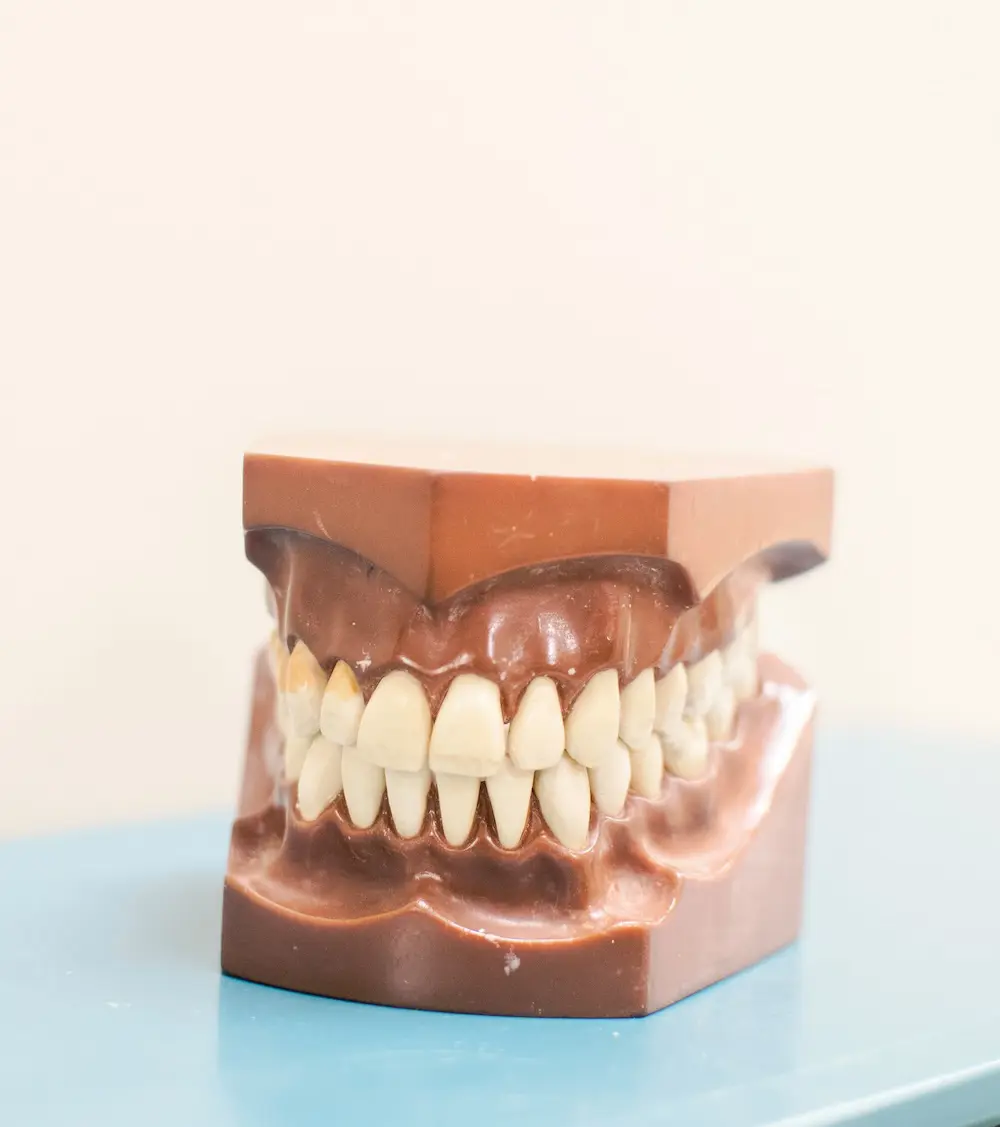Dental Implants are known as artificial designs that help as the replacement for the missing teeth. Implants are surgically inserted into the jawbone for artificial teeth. Dental veneers are customized covers that cover the front surfaces of teeth to cover cracks and gaps.
The choice between veneers and dental implants depends on several factors, from the patient's budget, needs, desires and longevity.
Veneers are a more cost-effective option for cosmetic improvements, but dental implants are the best long-term. Consult a dentist to decide on the best course of action for you.
Introduction To Dental Implants
Dental Implants are prosthetic tooth figures that are created with the help of titanium. They are surgically inserted into the jaw and are used to fill in the gaps left by missing teeth. It helps improve your teeth' appearance and increases its functionality.
Additionally, it helps in preventing bone loss and maintaining facial structure. Dental implants also help to preserve the bone by stimulating the underlying jawbone. Implants provide a natural-looking smile with improved chewing and speaking functionality.
They are also extremely durable with a lifespan of up to 18-20 years. Moreover, with proper maintenance and timely checkups, implants may last a lifetime.
Reasons For Getting Dental Implants:
- Dental implants offer a long-term solution for replacing lost teeth.
- To provide a natural smile, implants blend in with the surrounding teeth' color and fit perfectly in the space.
- By using a titanium post to secure dental implants in the jaw, implants help with the bite force of the real teeth.
- Implants provide support for your facial structure similar to natural teeth.
- With dental implants you can speak freely and naturally without any constrain because they work like real teeth.
- Because dental implants are composed of non-degradable materials cavities are not a problem.
- Speaking, laughing and eating are all made stable and confident by the solid anchoring of implants.
- Dental implants fill gaps left by missing teeth that prevent teeth from shifting positions.
- As a permanent tooth replacement option that doesn't need to be replaced or repaired, dental implants are made to last a lifetime.
- When it comes to replacing lost teeth, implants offer the most long-term value because they are strong.
Advantages of Dental Implants
Some of the benefits of Dental Implants are:
1. Longevity
Dental implants can last for twenty years or more giving a long-lasting solution. As a comparison to other dental restorations that may require replacement after a few years.
2. Strength and Stability
Implants are strong and stable. They allow the patient to use them much like natural teeth once fully combined into the jawbone.
3. Comfort
Dental implants feel and are comfortable, so you do not need to take extra care of them in your day-to-day life.
4. Preservation of Bone Health
Dental implants help to stop bone loss by acting as a natural tooth root substitute.
5. Enhanced Confidence and Quality of Life
Implants can improve self-esteem and social confidence by restoring a gorgeous smile. People can now have happier and more active lives. They are no longer concerned with hiding their smiles or avoiding particular foods due to their missing teeth.
6. Ease of Cleaning
Dental implants may be cleaned much like natural teeth and extend the life of the implant. In contrast to dentures and bridges that need thorough maintenance.
7. Improved Aesthetics
Dental implants look and feel like biological teeth. They are custom-designed to match the color, size and form of our teeth.
Drawbacks of Dental Implants
The following are a few of the drawbacks of Dental Implants:
1. Costly Procedure
Dental implants are more costly than the other tooth replacement options available. The initial cost can be quite high for a middle-class family.
2. Surgical Procedure
The surgical procedure always carries some risks and Implant placement also has a few risks involved. Bleeding, infection and damage to nerves are a few of the risks. Also, the post-healing time can be painful for some.
3. Bone Loss
Although implants are designed to preserve mandibles, they may cause bone loss in the vicinity of the implant, which may necessitate bone grafting surgery.
4. Mechanical Failure
Over time the dental implant might have some failure that can only be fixed through re-replacement or repair.
5. Not Fit for Everybody
Dental implants might not be a good option for patients with certain medical conditions like uncontrolled diabetes, cancer, gum disease or smoking habits.
What Are Dental Veneers?
Dental Veneers are thin shells that are formed with a mixture of porcelain or composite resin. These are made to cover the front surface of the teeth.
Dental veneers are a cosmetic dental treatment process that is used to restore the appearance of teeth. It deals with discolored, chipped, cracked, misaligned or abnormally shaped teeth. Veneers can also be used to fix gaps between the teeth.
Thin coatings can be applied to the front of teeth using dental cement providing a natural-looking alternative to repairing the teeth themselves. This method involves polishing a thin layer of the tooth and then adjusting it to a specific preference before cementing it onto the tooth.
Furthermore, with proper care veneers can last a long time and protect the underlying tooth surface.
Reasons For Getting Dental Veneers:
- It covers discolored or stained teeth to make teeth more white bringing out the natural smile.
- The treatment helps to reshape the irregular misshapen teeth in a more symmetrical appearance.
- Veneers can repair the function of teeth with chips, cracks, and tears.
- The dental procedure can fill in minor gaps between teeth to give the appearance of a more uniform smile.
- Veneers can cover up misalignments in teeth.
- It increases self-esteem and confidence by making teeth look better. Confidence makes people feel at ease.
- It provides a quick and minimally invasive solution for dental imperfections.
- Veneers are a traditional option for improving teeth due to their less modification of tooth structure.
- With proper care and maintenance, veneers can provide long-lasting improvements to the appearance of the teeth.
- Veneers are made to match the color, size and shape of the person's natural teeth.
Advantages of Dental Veneer
There are many advantages to getting a Dental Veneer. A few of them are:
1. Better Aesthetics
Covering flaws like stains, discoloration, chips, cracks and irregularities veneers can improve the appearance of teeth. It gives the appearance of a more consistent smile.
2. Natural Appearance
Porcelain veneers provide a natural teeth experience that blends in perfectly with all the other teeth. It imitates the clarity, color and texture of natural tooth enamel.
3. Usefulness
Veneers are an adaptable solution for smile enhancement. They can address a wide range of cosmetic dental issues such as discoloration, chipped or worn teeth, gaps between teeth and minor misalignments.
4. Minimal Tooth Alteration
Veneers require less modification of the natural tooth structure.
5. Conservative Treatment
Veneers provide a conservative method of treatment. They require only a small amount of tooth enamel to be removed to fit. There will be less discomfort and a quicker recovery period.
6. Fast Results
Veneers are a great choice for people looking to improve quickly. The change is noticeable in just a few dental visits.
7. Stain Resistance
People can enjoy a white, bright smile for a longer amount of time with porcelain veneers because they are very resistant to stains from food, drinks and tobacco products.
8. Durable
Veneers can last for many years with the right care and upkeep. It improves the appearance of the smile over time and provides an affordable smile makeover.
9. Simple Cleaning
Veneers are simple to keep clean and maintain. To keep them looking their best and lasting as long as possible regular dental exams, brushing and flossing are necessary.
10. Increased Confidence
Veneers can increase a person's self-esteem and confidence by making their smile look better. This makes it possible for people to smile and engage in social interactions confidently.
Disadvantages of Dental Veneers
Some of the Disadvantages of Dental Veneers are:
1. Restricted Durability
Veneer procedures are more prone to chipping, cracking and staining over time. This makes them less durable than crowns.
2. Dietary Restrictions
After the veneer procedure, the patients should avoid chewing hard things for a while. It might affect their diet plan.
3. Maintenance Requirements
Patients are required to wear mouthguards when playing sports and sleeping. Having a mouth guard makes it easier for their teeth to grind while they sleep and play.
4. Behavioral Modifications
People who have veneers should implement better oral hygiene practices. Examples of these practices include not biting or opening packages with the teeth.
Content Sources:
American Academy of Implant Dentistry










